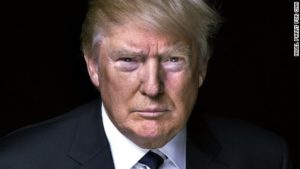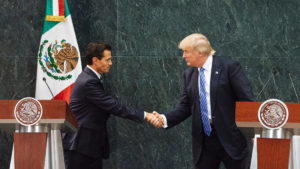Saturday, April 29 marked Donald Trump’s 100th day in office. Despite the short period, Trump has signed 78 executive actions.
This includes 30 executive orders that target the environment, education, trade and even includes the controversial immigration ban, also known as the travel ban.
In order to evaluate all Trump has done in regards to foreign policy, Dr. Niall Michelsen, a political science professor at WCU, had his United States foreign policy class grade the Trump Administration over the course of the semester.

Donald Trump courtesy of CNN
“When I came up with the idea, it was not that they would be grading the Trump Administration, but there was going to be a brand new administration. This is a great opportunity for students in an upper-level political science class to think critically about the new administration,” explained Michelsen.
His students broke foreign policy into six topics: national security, environment, trade, immigration, human rights and alliances.
The class was divided into six groups and the students continued to break down each topic into subtopics. For the first half of the semester, his students created rubrics for each subtopic where the students would then assign the Trump Administration an interim grade at the end of the semester.
“I think that the students have been, overall, some just like in any class are more into it than others, but the students are taking it seriously. They are approaching and developing the rubrics in a thoughtful way,” said Michelsen, pleased with his students’ progress.
Once the students graded each subtopic, the grades were then averaged for the overall topic grade. Here are the grades that the Trump Administration received:
Alliances: C
- United Nations: C-
- Latin America: C
- Russia: C
- Middle East: D
Since Trump’s inauguration, the United States’ relationships with our alliances have either dwindled or haven’t seen any immediate changes.
“Bombing the shit out of ISIS and Syria has diminished our relations with Russia,” said Rourke Sanderson, who focused on Russia.
For the Middle East, tensions have only increased.
“Bombing Syria and Afghanistan, as well as not handling the Syrian refugees well, has led to high tensions in the Middle East,” said Rachel Miller, focusing on the Middle East.
Relations in Latin America have also taken a turn for the worst.
An example would be the Wet-Foot, Dry-Foot. Although it was the Obama Administration that ended the policy, there was hope that Trump would reinstate it. However, Trump has shown no interest in bringing the policy back.
Human Rights: C
- Interventions: D+
- Foreign aid: D+
- UN human rights: C-
- Reconstructing governments: C
- Refugee aid: B-
When it comes to human rights, the Trump Administration dropped their obligations towards maintaining humanitarian responsibilities. Greyson Rowlands, a student who focused on interventions, points out that Trump hasn’t said anything about the turmoil in Venezuela.
“Democracy is a human right,” exclaimed Rowlands in response to the ongoing tension in Venezuela.
Interventions aren’t the only aspect of human rights where the Trump Administration is failing to do anything. Trump hasn’t done anything with reconstructing governments. Kimmy Hammond attributes Trump’s little action to his campaign motto, “Make America Great Again.”
“Trump ran on a campaign that was America first,” said Hammond
Immigration: C
- US/Mexico: B
- Refugee/sanctuary cities: C-
- Deportation: D
- Travel ban: C
- Human trafficking: A
Throughout Trump’s campaign, immigration was on the forefront. However, most of Trump’s actions have been continuously blocked.
For example, Trump has attempted to cut funding for sanctuary cities, but federal judges have prevented him from doing so. On April 25, Judge William H. Orrick stated that taking federal funds from cities because they don’t oblige with some federal immigration enforcement could be unconstitutional, effectively blocking another one of Trump’s attempts to enforce strict immigration policies.
Despite having his travel ban and fund cuts for sanctuary cities blocked, Trump has increased the amount of deportations as well as increased the amount of officers to patrol the border.
“Trump will hire 15,000 new officers to patrol the border,” said Ciera Wilson, who focused on immigration from Mexico.
To be exact, Trump plans to hire 5,000 border patrol agents and 10,000 Immigration and Customs Enforcement (ICE) officers.

Dr. Michelsen’s United States Foreign Policy class Photo by Keegan Wiggins.
Trump has also cracked down on human trafficking. Since his inauguration, Trump has signed an executive order that address human trafficking.
National Security: D+
- Great Powers relations balancing: B-
- State building/reconstructing Afghanistan and Iraq: F
- Nuclear proliferation: B
- Cyber security: D
- Russia and Syria: D-
Trump’s shaky start regarding his multiple changes to his national security council, from demoting Bannon and the resignation of Flynn, initially spelled a poor future for national security.
However, Trump has made a positive action by deploying a missile-defense system in Seoul, South Korea.
“The new missiles in South Korea gives the United States a bargaining chip, a leg up,” said Craig Daughtrey, a student that focused on nuclear proliferation.
Despite this advancement, Daughtrey points out that Trump needs to update our nuclear weaponry because it is heavily outdated, most still using floppy disks to operate. Additionally, it cost about $23 billion in 2015 to maintain and upgrade these systems according to the Congressional Budget Office (CBO). Daughtrey estimates that it would be cheaper to modernize nuclear weaponry compared to maintaining current systems.
Trump took a negative turn when it came to reconstructing Afghanistan and Iraq. Similar to Hammond’s subtopic, this can be attributed to Trump’s campaign “America first.”
“Afghanistan would have received a higher grade before Trump bombed it,” said Caroline Blew.
Environment: D
- Environmental security and protection: D
- Climate change: D
- International waste and air pollution: D
- Energy dependency: F
- International environmental organizations: C
During his campaign, Trump has made it clear that he is not concerned about the environment. From targeting the EPA to signing executive orders that will eventually eliminate environmental strides set in place by Obama, Trump has demonstrated that environmental concerns are not on his agenda.
As a climate change denier, Trump had no aversions to assigning Scott Pruitt, a fellow climate change denier, as the new administrator of the EPA.
Additionally, Trump’s proposed federal budget would cut $2.6 billion and 3,200 jobs from the EPA that would force them to cut multiple programs such as the Global Climate Change Initiative.
Since his inauguration, Trump has signed four executive orders that target environmental regulations and the use of energy.
While Trump has done a lot with the environment, it is a different story when it comes to international environmental organizations.
“Trump hasn’t done anything with international environmental organizations,” said Emily Giarette.
Despite doing nothing, it has been for the best. However, it does remain unclear whether or not Trump will pull out of the Paris Agreement. If Trump were to pull out, leadership would fall to China, which as the world’s biggest polluter, would be devastating for the environment.
Trade: C
- NAFTA: C-
- Foreign exchange: C
- Trade balance: C+
When it comes to trade, Trump has not had the chance to accomplish much since his inauguration.
One example is the democrats blocked the nomination for the U.S. trade ambassador, Robert Lighthizier. As a result, there hasn’t been a trade ambassador present to do anything, limiting the opportunities of trade work for the administration.
Additionally, the trade deals that Trump has been making have been made using tactics other administrations haven’t used, which was to be expected. For example, Trump verbally attacked Canada as not only a way to grab their attention, but also as a method of negotiating.
“There are more important issues that have come up such as the Syrian gas issues, and we thought as a group that it was more important for Trump to focus on those areas and take care of as much as he can get done,” said Lauren Mounce, explaining the lack of trade work the administration has done thus far.
After averaging the grades for each topic, the overall grade the class assigned the Trump Administration’s foreign policy was a C-. This was only slightly lower than the grade Michelsen gave Trump.
“On foreign policy, I would give the president actually a C, which is higher than I would have expected to at this point. In a lot of areas, the president has reversed direction from what the candidate promised to do,” said Michelsen.

Dr. Niall Michelsen. Photo by Keegan Wiggins
A prime example of Trump reversing his direction is his relationship with the North Atlantic Treaty Organization (NATO). Throughout his campaign, Trump referred to NATO as an obsolete institution. It wasn’t until he met the Secretary General Jens Stoltenberg that Trump declared that NATO “was no longer obsolete.”
Michelsen connects this change of opinion to a growing realization about the world.
“I think the candidate ran in a world that was a make-believe world,” said Michelsen, recalling Trump’s campaign.
When it came to launching missiles at Syria, Michelsen stated that this was a decision that any American president would have made, especially after the criticism that President Barack Obama faced in 2013 after a similar incident. However, Michelsen initially feared that the decision would lead to war in Syria, but so far, this hasn’t happened.
Trump’s final decision to launch missiles at Syria was similar to his NATO stance, because he also changed his opinion. For Syria, Trump changed his decision within a week. He originally stated that Syria’s problem was for Syrian people to work out.
These continuous changes in opinion are leading to tremendous uncertainty.
“I think there is as much uncertainty right now as there was when the administration was sworn into office because they have changed positions,” explained Michelsen.
This level of uncertainty transcends beyond America to the policies in the Korean peninsula. While there haven’t been many developments with North Korea other than lots of statements, tensions in the region have been growing.
“I’m not happy with that [growing tensions in the Korean peninsula]. It’s not all the United States or the current administration’s problem. The North Koreans are very problematic. I agree with what President Obama told President Trump in the transition of office that it’s going to be the biggest problem,” said Michelsen.
Michelsen worries that Trump’s cabinet is t0o militarized, resulting in an ex-military view of foreign policy.
“I worry that militarized cabinet may militarize our foreign policy to neglect our diplomatic side,” said Michelsen.
With these growing tensions in the Korean peninsula, Michelsen points out that it is important for the Trump Administration to recognize that China is a much-needed ally in the region.
However, the administration must also recognize that China is determined to increase their sphere of influence. This was noticeable when the Trump Administration backed out of the Trans-Pacific Partnership (TPP), which is an action Michelsen said he wouldn’t have done.
“The whole purpose of the TPP, which was a trading deal, was not to trade. That was not the important thing. The important thing was that it was going to help tie other Asian countries to the United States. China was not going to be included. It was an anti-Chinese, but a peaceful anti-Chinese,” claims Michelsen.
When Trump backed out of the TPP, it allowed China to take over the United States’ spot, spreading their influence to the other Asian countries. This action shouldn’t inspire further removal from Asia.
Switching the focus to our immediate neighbors, Michelsen anticipates some changes for the North American Free Trade Association (NAFTA).
“I think that the Mexicans are ready to have, and the Canadians probably, ready to discuss and renegotiate the NAFTA agreement, and it could well be that NAFTA doesn’t need to be adapted. It’s been around for a long time and probably needs something because any sort of agreement should be beneficial to all the members,” said Michelsen.
Similar to his stance on Syria and NATO, Trump has yet again completely flopped from his original stance.
During the campaign, Trump made his disdain for NAFTA clear. However, after being shown the economic benefits of keeping NAFTA as well as the devastation scrapping it would cause, Trump revised his decision to renegotiating the deal instead.

Donald Trump with Enrique Peña Nieto courtesy of The New York Times
“The United States has benefited from NAFTA. I think the Mexicans might want to get it modified to help them and make a better agreement from their perspective. They [Mexico] want something done so that the investors aren’t going to scare and pull out of Mexico for fear that the United States is going to rip up the deal and that Mexico is going to be disadvantaged towards the United States,” said Michelsen.
While these flops of the administration have been positive so far, the worry of where it may lead the United States is still persistent.
Taking all of this into consideration, how would you grade the Trump Administration?


